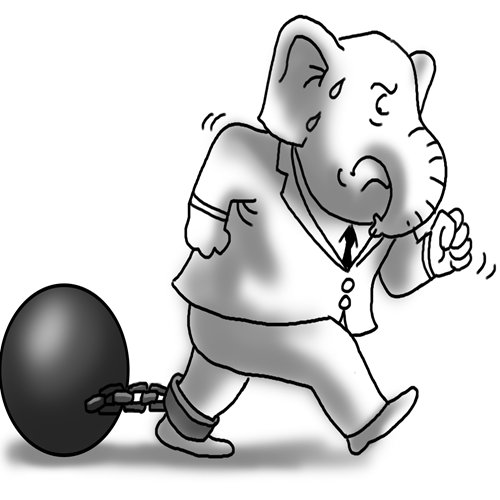


Illustration: Liu Rui/GT
When I was standing in the Nehru Memorial Museum & Library (NMML), looking up at the antique pillars, I felt like I had traveled into the past and could hear Jawaharlal Nehru, India's first prime minister, coming down the stairs.
A construction worker in a hard hat passed by me with a large bag of crushed bricks. He fiercely pushed open a door and poured the rubbles out. A huge cloud of dust rose, which pulled me back to reality.
The NMML was my very first stop after I arrived in India. It is a classic British architecture. Despite being aged and worn down due to the lack of maintenance, its shape and size can always make visitors realize its significance in the eyes of Indians.
One can imagine how Nehru must have felt when he moved into this building after India achieved independence in 1947. He must have been confident, envisioning in what way India would step on the global stage as a major power in the future.
He once said that "India, constituted as she is, cannot play a secondary part in the world. She will either count for a great deal or not count at all."
Nehru was not reaching for what is beyond his grasp, neither was he a dreamer. Any politician would have the same boldness of vision and breadth of spirit in his position.
Back then, India just broke free from British colonialism, came to possess the industrial and railway transport systems left behind by the British authorities and established a stable political system in the multi-ethnic, multi-religious nation.
Compared with the People's Republic of China, which was founded two years later, India was far ahead as the world's seventh largest industrial country with over 6 million industrial workers, while China only had around 1.2 million at that time.
The memorial hall exhibits Nehru's letters to his families written when he was put in jail by British colonists. He was imprisoned nine times throughout decades of anti-British struggle. Ten years in jail sharpened his determination and enlightened him with ideas to seek independence and start a revolution.
However, when he became the leader of India and moved into the mansion which was once the official residence of the British governor in India, Nehru's revolution was doomed not to be as profound as the Chinese reform.
He, following the British model, established the judicial, parliamentary and education systems. The four principles of his domestic policy are democracy, socialism, solidarity and secularism. Such a political model was created by British colonists in order to consolidate their rule and maintain stability in the multi-ethnic and multi-religious South Asia.
Revolution is one of Britain's greatest fears, and it needed stability in the region, as only in a stable environment, can the wealth of South Asia, accumulated over the past thousands of years, be delivered to Britain without disruptions.
Nehru's British education background as well as the ethnic and religious conflicts plaguing India at that time also placed constraints on him. He could only rely on the British model to ensure the nation's unity. Therefore, India embarked on a path of anything but revolution.
Drawing a comparison between India and China, one can clearly see differences of China's 1949 revolution. The revolution, led by the Communist Party of China, subverted tradition, broke social stratum, liberated women, eliminated illiteracy and realized the integration of education, postal service, railways and tax sectors. The gap between China and India didn't originate from their reforms at the end of the 20th century. It's hard to imagine what other ways, if not revolution, can bring about drastic changes to China in such a short period of time and pave the way for modernization.
The price of revolution may be heavy. But only by walking between India's cities and country, and standing in front of the building with an imperial atmosphere, can one get to know the meaning and role of revolution.
The author is a senior editor with People's Daily, and currently a senior fellow with the Chongyang Institute for Financial Studies at Renmin University of China. dinggang@globaltimes.com.cn. Follow him on Twitter @dinggangchina

 Award-winning photos show poverty reduction achievements in NE China's Jilin province
Award-winning photos show poverty reduction achievements in NE China's Jilin province People dance to greet advent of New Year in Ameiqituo Town, Guizhou
People dance to greet advent of New Year in Ameiqituo Town, Guizhou Fire brigade in Shanghai holds group wedding
Fire brigade in Shanghai holds group wedding Tourists enjoy ice sculptures in Datan Town, north China
Tourists enjoy ice sculptures in Datan Town, north China Sunset scenery of Dayan Pagoda in Xi'an
Sunset scenery of Dayan Pagoda in Xi'an Tourists have fun at scenic spot in Nanlong Town, NW China
Tourists have fun at scenic spot in Nanlong Town, NW China Harbin attracts tourists by making best use of ice in winter
Harbin attracts tourists by making best use of ice in winter In pics: FIS Alpine Ski Women's World Cup Slalom
In pics: FIS Alpine Ski Women's World Cup Slalom Black-necked cranes rest at reservoir in Lhunzhub County, Lhasa
Black-necked cranes rest at reservoir in Lhunzhub County, Lhasa China's FAST telescope will be available to foreign scientists in April
China's FAST telescope will be available to foreign scientists in April